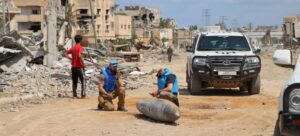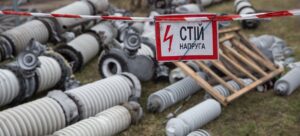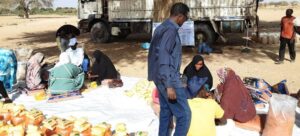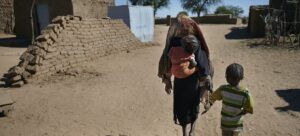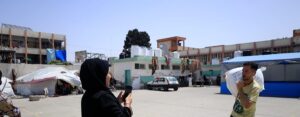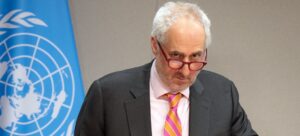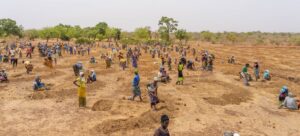“This is the most dangerous period; once people start returning to the north, that’s when most accidents will occur, because they won’t be familiar with where your unexploded ordnance is located,” said Mungo Birch, Chief of the UN Mine Action Programme (UNMAS) in the State of Palestine. “It’s important that once the returns start, we’re poised and ready to be able to provide the risk education they need.”
UN_News_Centre
Speaking on the sidelines of the 27th International Meeting of Mine Action National Directors and United Nations Advisers in Geneva, head of UN peacekeeping and mine action Jean-Pierre Lacroix underscored that the Organization stood with UNMAS in its support for “humanitarian efforts, to convoys” and risk assessment.
A humanitarian ceasefire remains a “priority”, insisted the Under-Secretary-General for Peace Operations and Chair of the Inter-Agency Coordination Group on Mine Action, along with providing “much more humanitarian assistance to Gaza”, once deminers and weapons experts deem that it is safe to do so.
Lebanon threat
The UN peacekeeping chief also underscored the dangers of a regional escalation amid ongoing exchanges of fire over the Israeli-Lebanon border. “Talking about Lebanon, then you know what needs to be absolutely avoided is further escalation,” said Mr. Lacroix. “That would be devastating frankly to Lebanon, the whole region.”
Amid reports that it will take some 14 years to clear Gaza of all the rubble created by the conflict, Mr. Birch noted that there are an estimated 37 million tonnes in total. “To put that in context, that’s more rubble than in Ukraine. In Ukraine, the front is 600 miles. Gaza is 25 miles long. It’s also 87 per cent urbanised, so it’s very densely packed construction.”
This includes some 800,000 tonnes of asbestos, “as well as various other contaminants”, he said. “…the problem is there’s more rubble in Gaza than there is space to spread it out,” Mr. Birch continued, describing how Israeli bombing sparked by Hamas-led attacks on Israel and rocket fire led to the destruction.
“There were lulls, but the bombardment was like nothing I ever experienced. I was with a colleague who had been in Ukraine, in the Ukrainian security forces, he said the bombardment was worse than anything he’d experienced in the Donbass.”
Rubble recyling for ‘the day after’
To tackle the issue of rebuilding Gaza after the fighting stops, Mr. Birch noted that recycling of the rubble “will figure heavily” in any reconstruction.
“I mean, people are already talking about ‘the day after’, quote unquote, for Gaza,” he added, noting that a “rubble removal” workshop was held two weeks ago in Jordan with UN agencies including the UN Development Programme (UNDP), the UN Environment Programme (UNEP) and other partners.
Despite the astonishing scale of the clearance operation ahead, UNMAS has just $5 million in funding. Another $40 million will be needed over the next 18 months just to start the process of clearance.
Worldwide, 60 million people in 60 countries live under constant fear of landmines, improvised explosive devices (IEDs) and unexploded ordnance, said UN peacekeeping chief Lacroix. They “do not know whether they will spend the day without being hit by a mine or an IED and who don’t know basically you know whether they will make it to the next day or whether their children or their relatives will make it to the next day – and that is really unacceptable.”
Ukraine’s global fallout
Despite no longer featuring as regularly among news headlines more than two years since the full-scale Russian invasion, the Ukraine conflict will continue to have “terrible consequences” in the country and globally for years to come, Mr. Lacroix insisted.

“The area that has been contaminated – the farmland that has been contaminated – used to provide food for 80 million people around the world, mostly middle-income and low-income countries.”
Echoing that concern, veteran landmine clearance specialist Paul Heslop explained that the economic ramifications of the conflict represented a “billions-of-dollar problem” that was happening at the expense of the world’s most vulnerable:
“If the mined land or the suspected mined land in Ukraine is causing fuel to be one cent a litre or two cents a litre more than it needs to be, or a loaf of bread or a box of pasta to be 10 cents a box, or a loaf more than it needs to be, and you multiply that across how many loaves of bread are bought every day in the world – billions; how many litres of fuel are used every day – billions; you start to talk about the economic impact of the perception and the presence of mines and UXO (unexploded ordnance) in Ukraine as being a billions-of-dollar problem for every country in the world.”
Beyond the economic impact of the Ukraine war, Mr. Heslop – Programme Manager for Mine Action at UNDP Ukraine – described the terrible injuries being caused by the fighting:
“It’s not just a lower limb like we’ve seen a lot of in Africa over the years where you know, somebody’s out gathering firewood or fruit and they step on the mine and they blow their leg off. In Ukraine, because of the nature and the intensity of the conflict, we’re often seeing double or triple or even quadruple amputees, and a lot of the those injured are in their 20s and 30s.”
Sudan danger zone
Demining action and removing the risk of unexploded weapons is already a serious problem in Sudan, where more than a year of fighting between rival militaries has left millions on the verge of famine, including in major built-up areas where people have little idea about the dangers.
“It’s a big change; a big risk is obviously for the civilians because the people, residents of the capital, they never experienced this kind of war in the history of Sudan,” said Mohammad Sediq Rashid, Chief of UN Mine Action Programme in Sudan.
“Unfortunately, unexploded ordnance accidents are happening now. There’s a little bit of change in terms of access. Part of the capital is now gradually becoming accessible, so civilians are not waiting for (mine) clearance to happen.”
